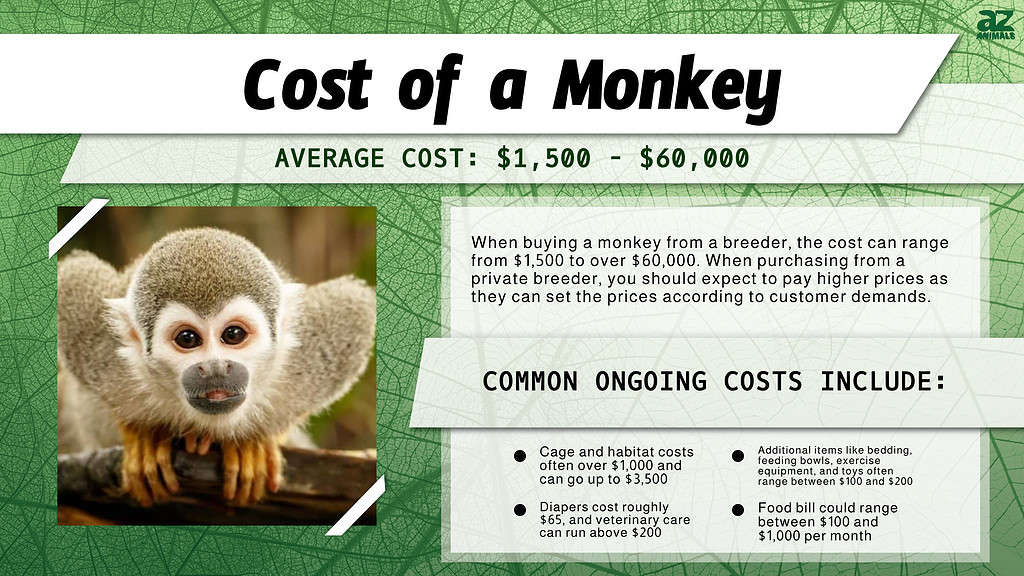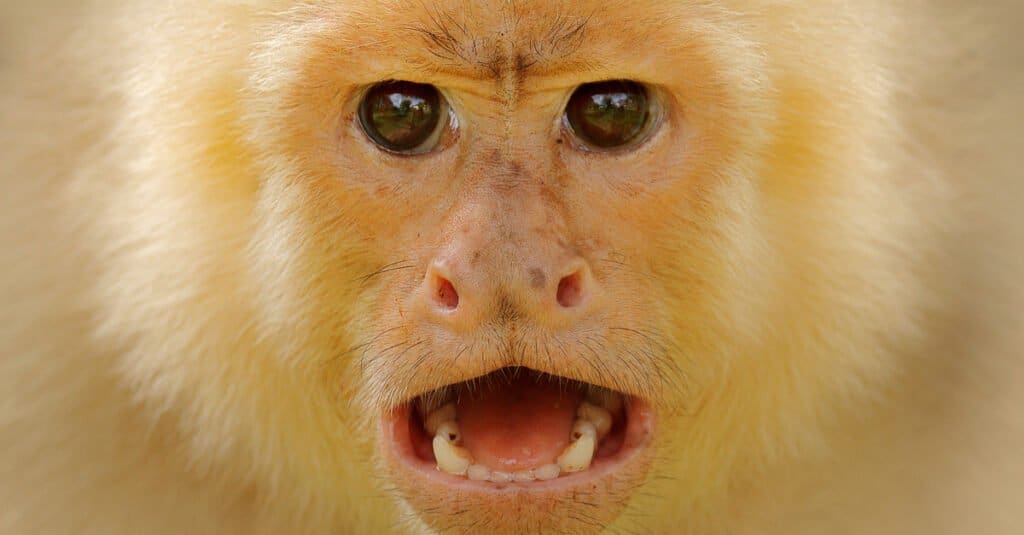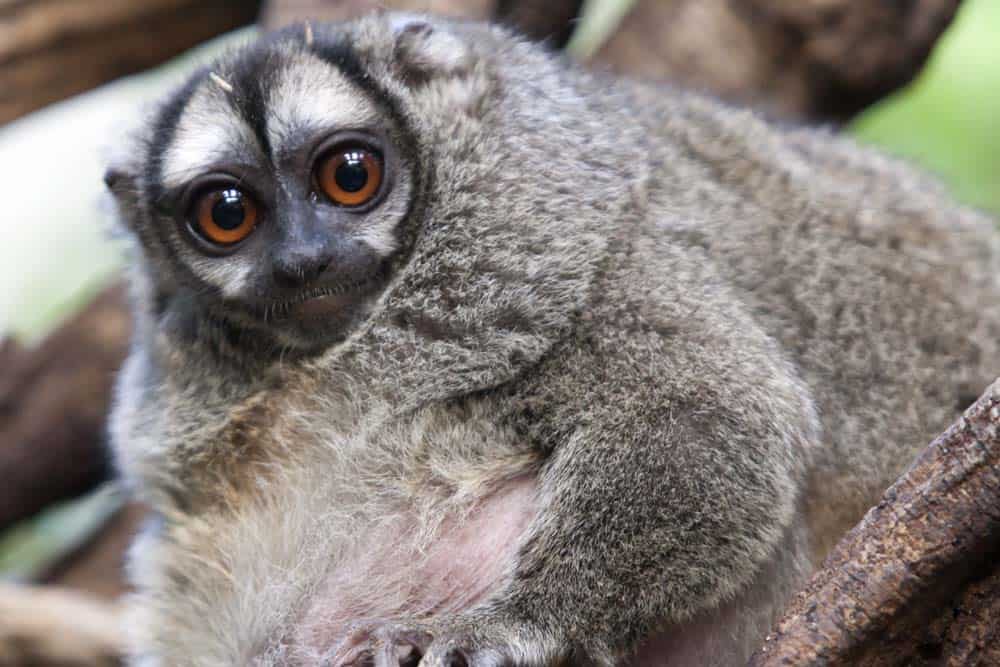Monkeys are smart, entertaining, cute animals, making them desirable pets. You can train many species after domesticating them. You can even teach some monkeys to do tricks and chores in the home. Although purchasing a monkey as a pet sounds enticing to many animal lovers, they come with much effort and maintenance. Let’s find out the cost of monkeys and whether you should get one as a pet.

Cost of a Monkey
Although most pet monkeys are small to medium, they cost much more than the average pet. This cost is because the price of the monkey depends on the species. But besides this, all species of monkeys are expensive. When buying a monkey from a breeder, the cost can range from $1,500 to over $60,000. When purchasing from a private breeder, you should expect to pay higher prices as they can set the prices according to customer demands. Demand can change following a popular movie featuring a cute monkey, for example. If the film features a capuchin monkey, the cost of buying this species will rise.
The average price of popular monkey species are:
- Capuchin monkeys – $5,000 to $7,000
- Squirrel monkeys – $9,000 or more
- Macaques – $4,000 to $8,000
- Spider monkeys – $6,000 to $14,000
- Marmoset monkeys – $1,500 to $2,500
- Tamarin monkeys – $1,500 to $2,500
- Baboons – $3,500 or more
You can also adopt a monkey. This effort to become a primate pet owner is free in some instances but can still be as costly as purchasing a monkey from a breeder. Sometimes, zoos and other animal facilities give monkeys up for adoption at lower prices than breeders charge. However, zoos and other animal facilities often receive offers or requests to adopt monkeys and other animals, so these institutions offering primates for adoption are rare. Still, there are rare situations where individuals might be able to adopt a monkey.
Costs of Preparing for a Monkey
As expected with any pet, there are additional costs besides purchasing. The monkey will need a cage, habitat, food, veterinary care, and diapers if it is going to be in the same area as humans. These expenses pile up as cages often cost over $1,000 and can go up to $3,500. Monkeys also need additional items like bedding, feeding bowls, exercise equipment, and toys in their cage or enclosure. These items often range between $100 and $200. Diapers cost roughly $65, and veterinary care can run above $200.

A capuchin monkey is a common monkey species to keep as a pet.
©Ondrej Prosicky/Shutterstock.com
Monthly Costs of Owning a Monkey
Monkeys live long lives if you give them the proper care they need. This care means you will pay between $200 and $1,000 monthly for years to come. However, this amount depends on the species you own. Larger monkeys cost more as they eat more and need new toys and exercise equipment more regularly. Smaller monkeys eat less food and are not as destructive as bigger monkeys which means they are somewhat more cost-effective. However, do not underestimate the damage smaller monkeys can do when bored because they can rip up furniture and injure family members, pets or you, resulting in costly medical treatment.
Monkey’s Health Care
Monkeys are not your average pet, so regular veterinarians often cannot offer your pet monkey the necessary health care. This requirement also means owners may have to find a vet specializing in treating primates. The monkey’s health care bills may not be a monthly expense if you look after them well. Still, they may suffer from a particular condition, requiring regular medication and expert care. In that case, health care costs can rise to over $500 per veterinarian visit or more.
Food Bills
Depending on the monkey’s species, age, and size, their food bill could range between $100 and $1,000 per month. Smaller monkeys only need small amounts of food, fruits, and vegetables per month. Because of their diet, the food bill could add up to about $100 per month. Bigger pet monkeys will need more food or may require a special diet.
Insurance
Because monkeys are known to be mischievous, they often get themselves into sticky and dangerous situations. This behavior is why you must take out insurance for your pet, as they will most likely require a doctor’s visit at least once in their lifetime. Pet insurance is roughly $50 per month but can cost more depending on the species. You might also want to consult with your insurance adviser regarding cover for damages, should your pet primate harm someone, their pets, or their property. So, consider the cost of pet monkey care before buying one.
Should You Get a Pet Monkey?
Although monkeys can be lovable, affectionate, and entertaining pets, it is not advisable to get one. Monkeys are wild animals, unlike common pets like cats, dogs, and hamsters. These animals are not domestic and often dislike being in captivity. Smaller monkeys might be more manageable, but owners tend to spoil them. When owners indulge larger primates, they can become challenging to manage and dangerous to have around your home and family.

The cost of a pet monkey might be affordable for many but the best place for a monkey is in the wild and not in a cage.
©Edwin Butter/Shutterstock.com
Laws Regarding Owning Monkeys
Internationally, monkeys have been protected by the United Nations Convention on International Trade in Endangered Species of Wild Flora and Fauna, but this has not stopped countries from creating their own legislation. In the United States, the laws surrounding owning monkeys differ across states. For example, keeping a monkey in some states is legal, while others require owners to have a permit.
The states that have no restrictions regarding the ownership of monkeys are:
- Alabama
- Arkansas
- Illinois
- Iowa
- Kansas
- Missouri
- Montana
- Nebraska
- Nevada
- North Carolina
- North Dakota
- Ohio
- South Carolina
- Virginia
- Washington State
- West Virginia
- Wisconsin
The states which have a total ban on the private ownership of monkeys are:
- California
- Colorado
- Connecticut
- Georgia
- Kentucky
- Louisiana
- Maine
- Maryland
- Massachusetts
- Minnesota
- New Hampshire
- New Mexico
- Pennsylvania
- New Jersey
- New York
- Rhode Island
- Utah
- Vermont
- Wyoming
The photo featured at the top of this post is © iStock.com/alexandragl1
Thank you for reading! Have some feedback for us? Contact the AZ Animals editorial team.






